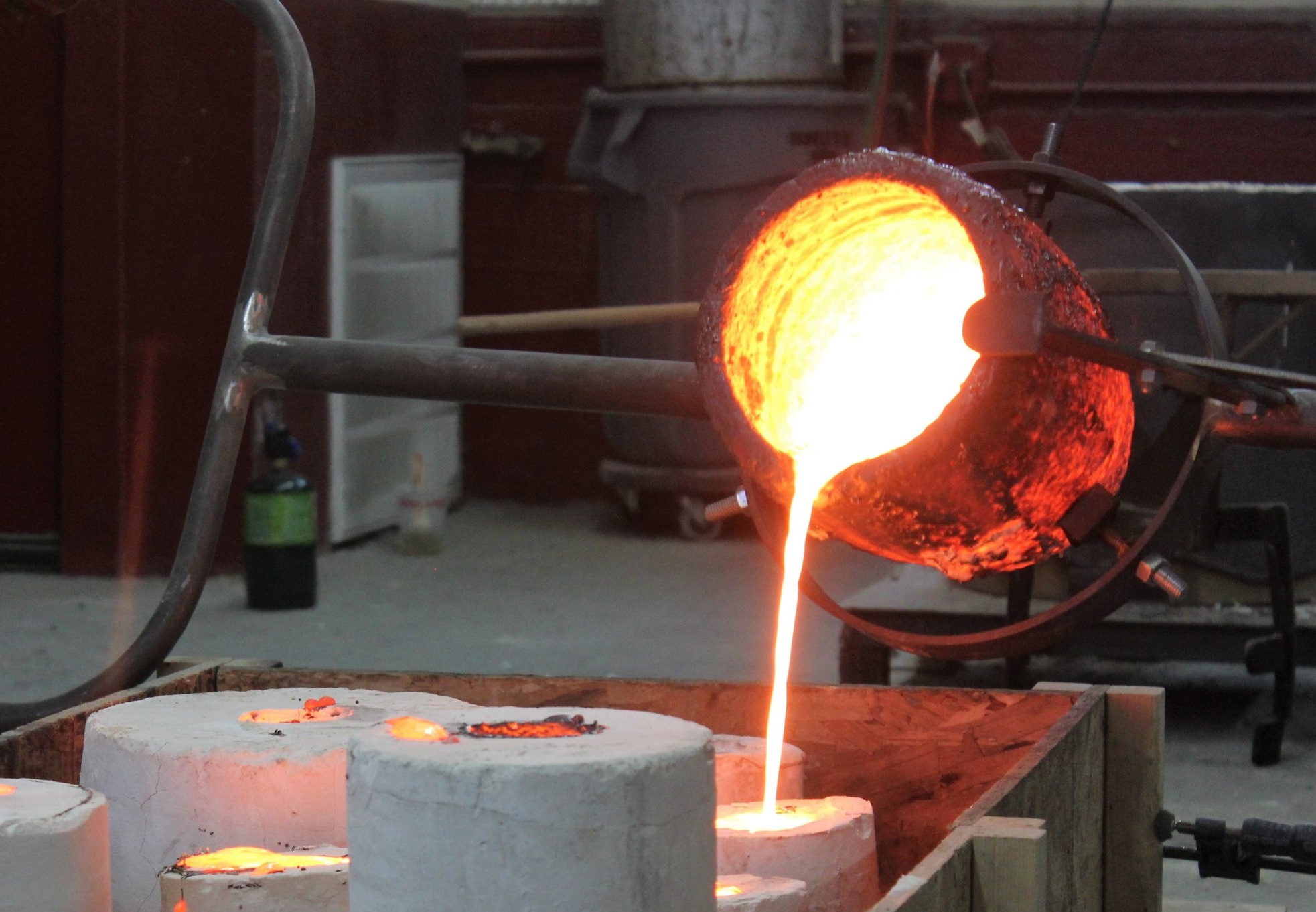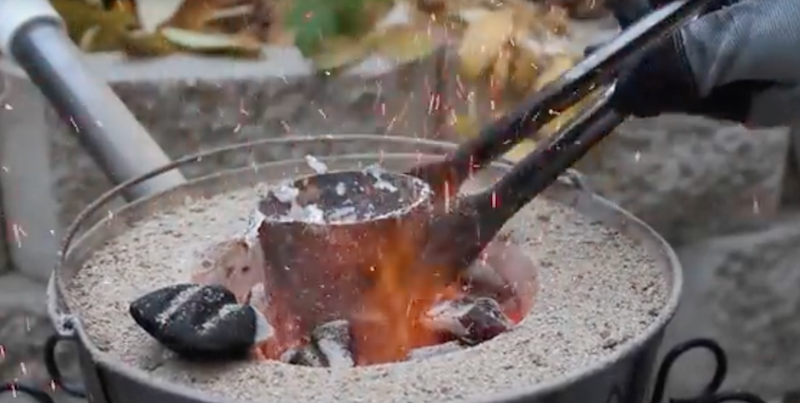Comprehensive Look into How a Metal Foundry Produces Precision Components
Wiki Article
A Comprehensive Guide to Metal Casting: Advantages and Services Used by Foundries
Metal casting is a vital procedure in different sectors, supplying countless benefits with the solutions of factories. These centers transform molten metal into exact and resilient elements, satisfying details customer needs. By employing sophisticated modern technologies, shops guarantee quality and performance in manufacturing. The details of metal casting and the diverse techniques included increase crucial inquiries concerning its role in modern manufacturing. What innovations lie ahead in this necessary area?Recognizing the Metal Casting Process
The metal casting procedure is an essential method used in producing to produce complex shapes and components. This approach entails putting molten metal right into a mold and mildew created to develop the desired things. The procedure begins with pattern production, which functions as a template for the mold and mildew. Aluminum Foundry. Different materials, such as sand, metal, or ceramic, are utilized for mold-making, depending on the details needs of the casting
Once the mold and mildew is prepared, liquified metal is poured right into it and allowed to cool and solidify. After solidification, the mold is removed, disclosing the cast part. Numerous methods, consisting of sand casting, financial investment casting, and pass away casting, are utilized, each suited to different applications and products. Quality control steps, such as inspections and testing, are important to ensure the end product satisfies requirements. In general, the metal casting process plays a vital duty in generating components for markets varying from automotive to aerospace.
Trick Benefits of Metal Casting
Metal casting offers substantial advantages that make it a favored production technique in various markets. Its layout flexibility and precision enable detailed shapes, while economical mass production improves efficiency. In addition, the flexibility and toughness of products utilized in casting add to the durability of the end products.Style Versatility and Accuracy
Launching impressive layout adaptability and accuracy, metal casting allows developers and engineers to create complex shapes and functions that would certainly be impossible or difficult to attain with various other manufacturing techniques. This ability makes it possible for the manufacturing of complicated geometries, inner frameworks, and great details that enhance product performance and aesthetics. Additionally, different casting methods, such as sand casting, financial investment casting, and pass away casting, supply additional alternatives for modification, accommodating varied material homes and task needs. The versatility of molds permits modifications during the design stage, simplifying the change from principle to last product. Eventually, metal casting stands out for its ability to deliver high-precision parts, making it an indispensable process in industries ranging from automotive to aerospace and past.Cost-efficient Automation
Cost-effective mass manufacturing stands as one of the main advantages of metal casting, making it possible for producers to produce big quantities of parts at a lower expense per system. This performance develops from the ability to create intricate mold and mildews that can be recycled multiple times, considerably reducing setup and operational costs. Additionally, metal casting procedures, such as sand casting and die casting, enable high throughput, making it possible to satisfy the demands of massive manufacturing runs. The lowered product waste and power usage additionally enhance cost financial savings, making metal casting an eye-catching alternative for sectors needing mass parts. Overall, the cost-efficient nature of metal casting positions it as a recommended approach for manufacturers intending for financial efficiency in their production processes.Material Convenience and Toughness
Among the standout attributes of metal casting is its impressive product versatility, which enables using a variety of alloys and steels. This flexibility enables producers to choose products that best fit their details applications, from light weight aluminum and bronze to iron and steel. Each metal supplies distinct residential or commercial properties, consisting of differing degrees of toughness, corrosion resistance, and thermal conductivity. Metal casting can produce components that fulfill strict performance demands throughout varied sectors, such as automobile, aerospace, and construction. In addition, the stamina of actors metals can be enhanced with numerous therapy procedures, making certain toughness and long life. Metal Casting. Generally, the combination of material convenience and integral stamina makes metal casting a favored option for producing high-quality partsSorts Of Metal Casting Methods
Metal casting encompasses a selection of methods that satisfy various manufacturing needs and material homes. Typical techniques consist of sand casting, which makes use of a sand mold and mildew for intricate shapes, and financial investment casting, known for its accuracy and surface area coating. Die casting is an additional method that uses high-pressure injection of liquified metal into mold and mildews, suitable for automation of little parts.Covering molding offers a quicker alternative, making use of a resin-coated sand to create thin-walled mold and mildews, while lost foam casting enables intricate styles without the need for a core.
Furthermore, continuous casting is used for generating long areas of metal, such as bars or sheets, by strengthening liquified metal in a constant procedure. Each technique presents special advantages and is chosen based upon factors like the needed information, production volume, and material type, making certain superior end results in metal fabrication throughout various sectors.
The Role of Foundries in Metal Casting
Shops play a critical duty in the metal casting process, offering as the facilities where molten metal is transformed right into finished items. These specialized establishments are geared up with the necessary tools and modern technologies to manage numerous steels, making certain top quality end results. Factories are liable for several vital functions, consisting of thawing the metal, pouring it into mold and mildews, and allowing it to strengthen.Furthermore, they keep strict security and ecological criteria to shield employees and decrease environmental effect. Competent technicians and designers work together to enhance casting processes, improving performance and lowering waste. Shops likewise take part in quality assurance measures, guaranteeing that the last products fulfill certain resistances and specs. This quality control is important for industries that depend on specific components, such as automotive and aerospace. As an outcome, factories add substantially to the total production landscape, making it possible for innovation and development throughout numerous industries.
Custom-made Metal Casting Solutions
Custom-made metal casting services provide tailored style options that satisfy specific client needs. These solutions likewise supply product selection expertise, making sure the ideal metal is selected for the desired application. Such adaptability and expertise enhance the general high quality and performance of the end product.
Tailored Layout Solutions
Tailored design solutions in metal casting supply suppliers with the versatility to produce elements that meet certain efficiency and aesthetic requirements. Shops provide tailored solutions that allow clients to specify measurements, shapes, and surface area finishes to accomplish wanted end results. This modification process commonly includes collaboration between developers and designers, making certain that the last items align with functional needs and sector requirements. Advanced technologies, such as computer-aided design (CAD) and simulation software application, allow accurate modeling and screening of parts prior to manufacturing, boosting and decreasing errors efficiency. By leveraging tailored style solutions, companies can enhance performance while minimizing waste and prices, inevitably leading to an extra affordable edge out there. This flexibility is crucial for industries needing special applications and specs.Product Choice Expertise
When selecting products for metal casting, proficiency plays a crucial function in ensuring that the ideal selection aligns with both efficiency demands and cost-effectiveness. Shops use experienced professionals who recognize the buildings of various steels and alloys, permitting them to suggest excellent materials for certain applications. Aspects such as stamina, rust resistance, and thermal conductivity are thoroughly considered to satisfy the customer's needs. Additionally, market patterns and developments in product scientific research notify these choices, making it possible for factories to remain competitive. By leveraging their experience, shops can assist customers in guiding through facility material alternatives, eventually leading to enhanced product high quality and reduced manufacturing prices. This specific understanding is essential for accomplishing effective outcomes in custom-made metal casting services.High Quality Control in Metal Casting
Quality control in metal casting is vital to guarantee that the final items meet the needed specs and efficiency standards. Factories use a variety of approaches and strategies to assure the finest quality of actors elements. This procedure begins with rigid product examinations, validating that raw products abide by market standards. Throughout the casting process, real-time surveillance and screening are carried out to evaluate specifications such as temperature, mold honesty, and dimensional accuracy.
Applications of Metal Castings Throughout Industries
Metal spreadings play a crucial role in various markets, functioning as the backbone for many applications. In the vehicle market, cast parts such as engine blocks and transmission real estates are essential for vehicle performance and dependability. The aerospace industry counts on accuracy castings for essential components that assure safety and effectiveness in trip. Additionally, the building and construction industry utilizes metal spreadings for fixtures, installations, and architectural components, boosting the durability of structures and framework.Moreover, the energy industry gain from spreadings utilized in wind turbine blades and other tools crucial for power generation - Metal Foundry. The clinical field likewise makes use of metal spreadings in instruments and gadgets, demonstrating the convenience of this manufacturing process. In general, metal spreadings are important to the functionality and innovation of varied sectors, showcasing their significance in modern-day innovation and infrastructure advancement
Frequently Asked Questions
What Materials Are Commonly Utilized in Metal Casting?
Common materials made use of in metal casting consist of aluminum, iron, bronze, brass, and steel. Each material supplies unique residential properties appropriate for numerous applications, enabling suppliers to select the very best option based on deterioration, weight, and stamina resistance.For how long Does the Metal Casting Process Commonly Take?
The metal casting process usually takes numerous hours to a couple of days, depending on elements such as the complexity of the style, kind of metal made use of, and the specific casting method utilized by the factory.
What Is the Ecological Impact of Metal Casting?
The environmental effect of metal casting consists of power usage, exhausts, and waste generation. Shops often implement steps to reduce these impacts, such as recycling materials and using cleaner innovations to minimize their environmental impact.Can Metal Casting Be Provided For Small-Scale Projects?
Metal casting can without a doubt be executed for small tasks. Numerous factories satisfy such requirements, providing personalized services that suit limited manufacturing runs while keeping high quality and precision in the end products.What Are the Precaution in Metal Casting Foundries?
In metal casting foundries, precaution include individual safety devices, proper ventilation, training on tools usage, emergency procedures, regular upkeep checks, and adherence to market security standards to minimize threats connected with molten metal and hazardous products.Furthermore, metal casting processes, such as sand casting and pass away casting, enable for high throughput, making it practical to fulfill the needs of massive production runs. One of the standout features of metal casting is its exceptional product flexibility, which permits for the use of a wide array of alloys and steels. Additionally, continual casting is used for generating long areas of metal, such as bars or sheets, by solidifying liquified metal in a continuous procedure. Foundries play a crucial role in the metal casting procedure, serving as Aluminum Foundry the centers where liquified metal is transformed into ended up products. Usual materials made use of in metal casting include light weight aluminum, iron, brass, bronze, and steel.
Report this wiki page